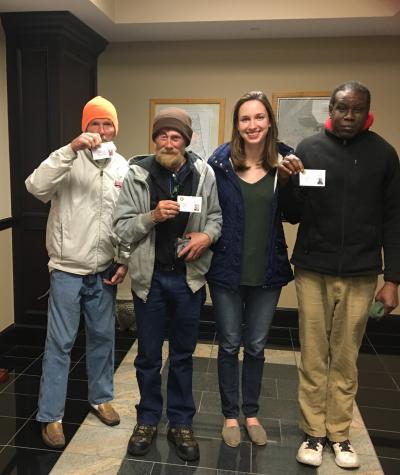The author, Ellen Boettcher, is a Re-enfranchisement Outreach Fellow for the Alabama Voting Rights Project
In June 2018, I started working as a Re-enfranchisement Outreach Fellow with the Alabama Voting Rights Project (AVRP), in an effort to help citizens with past convictions understand their paths to voting rights restoration and to register to vote when possible. AVRP is a partnership of Campaign Legal Center and Southern Poverty Law Center.
Last year, Alabama passed a law clarifying which convictions disqualify a citizen from voting. The change re-enfranchised an estimated 76,000 people. However, the state did not invest any resources in public education around the law change. Because of this lack of education, 71.7 percent of affected Alabamians still do not know that their rights have been restored.
On August 21, 2018, I met Luella Powell, a citizen who did not know that she was eligible to register to vote. Ms. Powell was certain that she could not vote, as she was recently released from prison and experiencing homelessness. She was so certain, in fact, that when I asked about her voter registration status, she laughed in my face.
Ms. Powell was skeptical when I informed her that changes to Alabama state law may have made it possible for her to register. Much to her surprise, we determined that her conviction was not disqualifying and that she could register to vote immediately.
But, understanding her right was only the first in a series of barriers that Ms. Powell faced on the path to casting a ballot.
Because Alabama has voter ID requirements at the polls, Ms. Powell needed an accepted form of ID in order to vote on Election Day. But she did not have an Alabama ID or the $37.50 needed to purchase one. I advised her to go to the Mobile County Board of Registrars the next day with her registration application to obtain a free voter ID.
Ms. Powell attempted to get a free voter ID card with the only form of ID in her possession, her Alabama Department of Corrections (ADOC) prison ID. Although the ADOC ID showed her name, picture, and date of birth, the registrar did not accept the ID as sufficient, and denied Ms. Powell a free voter ID.
Despite the fact that she was now eligible to register to vote, Ms. Powell would not be able to exercise that right on Election Day because she could not obtain any form of voter ID.
In 2018 AVP launched a statewide public education campaign, which eventually encouraged the Secretary of State to agree that expired jail or prison IDs, like the one Ms. Powell had, were qualifying documents that would allow an individual to easily obtain a free voter ID.
While tens of thousands of previously incarcerated Alabamians had their voting rights restored, there is no telling how many of those individuals would have been barred from the polls on November 6, 2018 because they had no accepted voter ID or had been unable to obtain one.
Because of the success of our public education campaign voters like Ms. Powell were able to use their ADOC IDs to help them meet the requirements to exercise their right to vote.
On September 27, 2018 Ms. Powell used her expired ADOC ID to get a free voter ID. This new form of identification not only allowed her to vote on Election Day, but, unlike her ADOC ID, it is a form of identification that represents her future, not her past. She was thrilled to obtain this form of ID and to be able to exercise her right on Election Day.
